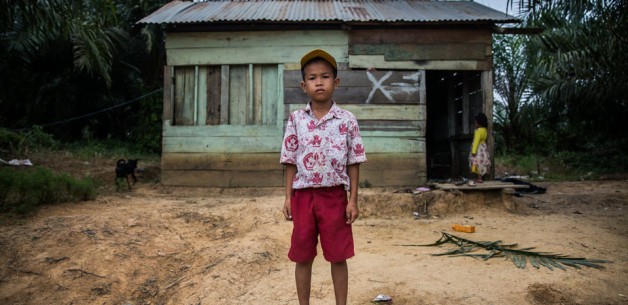Picture of KEMAL JUFRI / Photo credit FERN AND ICIJ
In the latest installment of “Evicted and Abandoned”, a year-long investigation into the ‘hidden toll of development’ financed by the World Bank, the International Consortium of Investigative Journalists, in collaboration with The Food & Environment Reporting Network, tells the story of Revan Pragustiawan, a little boy who is forcibly displaced from his ancestral home on the Indonesian island of Sumatra by a World Bank-backed palm oil company. Four years later, Revan continues to suffer serious psychological trauma from having seen his home destroyed, as his family struggles to provide him and his siblings with adequate nutrition and other basic necessities where they were forced to resettle.
Revan’s story is a worst-case example of the trauma that children can suffer when they live in the path of initiatives sustained by money from the World Bank Group, the multinational financial giant that styles itself as an anti-poverty champion.
The World Bank’s resettlement policy, one of its environmental and social safeguards, does not adequately address the fact that children suffer differently and disproportionately from forced evictions. BIC’s own Elana Berger, Child Rights Program Manager, is quoted in the article, noting that “even temporary disruptions in schooling, family income and living conditions can have devastating effects on a child’s development.”
It was the World Bank Group’s private lending arm, the International Finance Corporation (IFC), that supported the palm oil company responsible for displacing Revan and his family in 2011. Complaints filed by indigenous communities like Revan’s affected by expanding palm oil plantations charged that the IFC ignored its own social safeguards that require the free, prior and informed consent of indigenous peoples whose livelihoods and land rights are affected by its loans.
Revan’s story is an unfortunate lesson for the World Bank Group that it cannot reach its anti-poverty objectives without adopting strong policies on resettlement. In order to protect its most vulnerable stakeholders, the World Bank should require that concrete plans are in place to shield children from the negative impacts of resettlement, and to consult children themselves on the policies and projects that affect them. BIC’s Child Rights program will continue to advocate for these goals in the context of the World Bank’s ongoing safeguards review.

